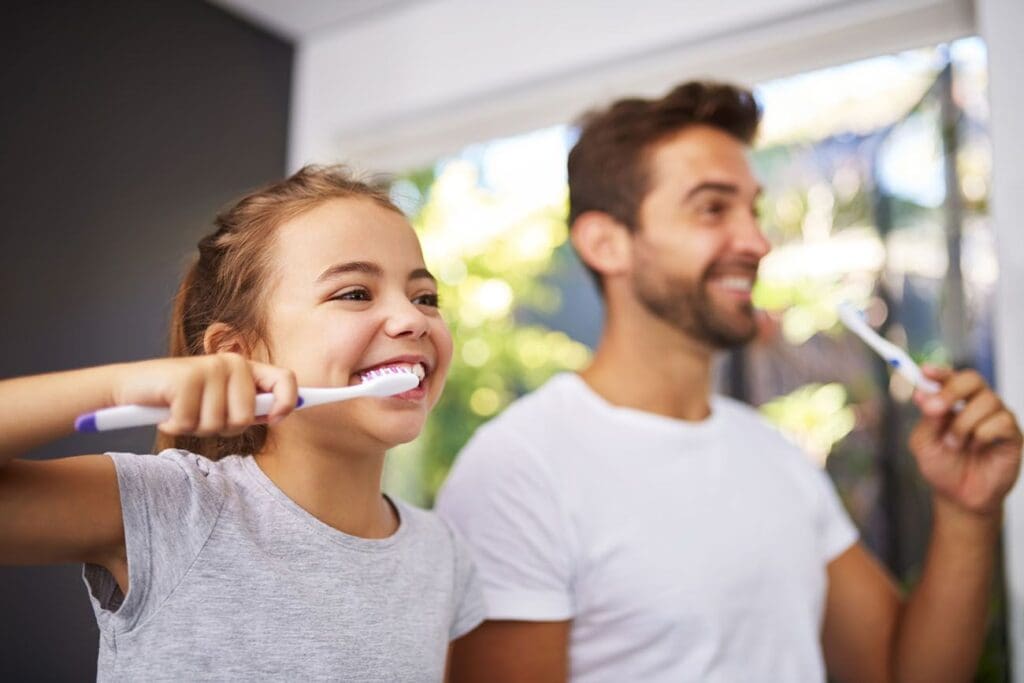Helping kids build good oral habits early on sets them up for a lifetime of healthy teeth and gums. Parents play a big part in teaching their children how to care for their teeth. Starting early with good oral health care can benefit kids as they grow into adults. The habits they learn can have a lasting effect on their overall health.

Teaching Good Oral Habits Early
When kids learn how to care for their teeth at a young age, they are more likely to keep those habits throughout their lives. Brushing and flossing every day helps prevent cavities and gum disease. If children brush their teeth twice a day with fluoride toothpaste, they can avoid many common dental problems.
It’s important for parents to watch and help their kids until they learn how to do it right. Starting early makes brushing and flossing feel natural. Kids should start brushing their teeth as soon as they get their first tooth.
A soft toothbrush and a small amount of fluoride toothpaste are all you need. Teach kids to brush in small circles to clean all sides of the teeth. Once two teeth touch, it’s time to start flossing. Flossing helps remove food and plaque from between the teeth where a toothbrush can’t reach.
Preventing Problems Before They Start
Taking care of teeth early can help prevent many dental issues. Regular dental check-ups allow the dentist to find problems before they get worse. Dentists can catch small cavities and treat them before they turn into bigger problems.
Fluoride treatments and sealants also protect kids’ teeth. When kids get the care they need early on, they have fewer dental problems as adults. Regular visits to the dentist can also make kids less afraid of dental appointments.
Cavities and gum disease can cause pain and discomfort, but if these problems go untreated, they can lead to serious issues like infections or even tooth loss. By keeping up with regular care, kids can avoid the pain and complications that come with poor oral health. It’s best to start taking kids to the dentist by their first birthday. During these visits, the dentist can give advice on how to care for your child’s teeth and answer any questions you may have.
Saving Money with Early Care
Good oral habits can also help families save money in the long run. It costs less to prevent dental issues than to treat them. Fillings, crowns, and root canals can be expensive.
By teaching kids how to care for their teeth, parents can help them avoid costly dental procedures later in life. Regular cleanings and check-ups keep teeth in good shape, which can prevent the need for more expensive treatments down the road.
Many dental insurance plans cover preventive care like cleanings and exams, but treatments for bigger problems can be pricey and might not be fully covered. By stopping problems before they start, families can save money on dental care. Having good oral health also lowers the chances of needing emergency dental visits, which can be stressful and expensive.
How Oral Health Affects Overall Health
Taking care of teeth isn’t just about having a nice smile. Good oral health plays a big role in overall health, too. Poor oral hygiene can lead to infections that spread to other parts of the body. Bacteria in the mouth can enter the bloodstream and affect the heart and other organs.
Kids who learn good oral habits reduce their risk of these health problems. Healthy teeth and gums keep the body healthy.
Good oral health can also make a difference in how well we digest food. Problems like gum disease have been linked to more serious health conditions, including heart disease, diabetes, and breathing issues. By keeping their teeth and gums healthy, kids can lower the risk of developing these conditions later in life. Taking care of teeth also helps support a strong immune system, contributing to overall physical health.
Building Lifelong Habits
When kids develop good oral habits early, they’re more likely to keep them as adults. Brushing and flossing become part of their daily routine. Regular dental visits also become a habit. These lifelong habits lead to better oral health and an overall healthier life. Parents who make oral health a priority help set their kids up for success.
Consistency is key to making these habits stick. Parents should create a routine where brushing and flossing happen at the same times each day. This helps kids remember to take care of their teeth. Fun toothbrushes and tasty toothpaste can make brushing more enjoyable for kids.
Parents can also use reward charts to encourage kids to keep up with their brushing. By making oral care a positive experience, parents can help their kids develop habits that will last a lifetime.
At the end of the day, early oral care is about more than just preventing cavities. It’s about giving kids the tools they need to care for their teeth and overall health for years to come. By starting early and being consistent, parents can make sure their children have strong, healthy smiles that last a lifetime.
